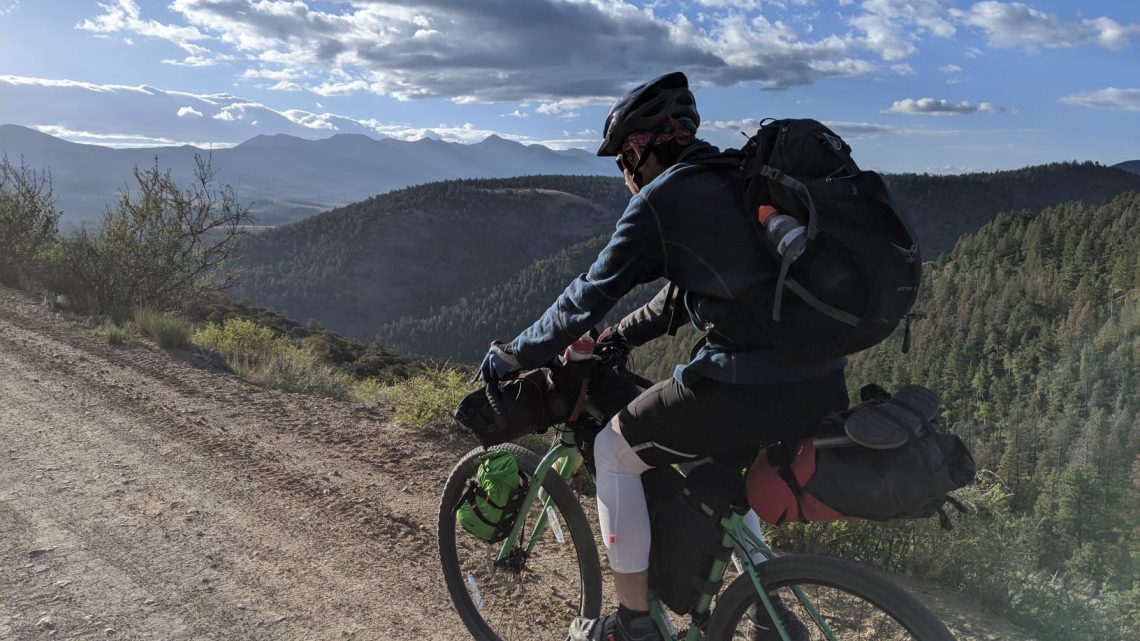My friend Bob Goodman and I were over 200-miles into our 350-mile bikepacking trip in southern Colorado, when a freak accident snapped my spine in half. Bikepacking is like backpacking, except with a mountain bike. Instead of carrying your gear in a heavy backpack, the gear is strapped to a mountain bike. A typical day of bikepacking for us consists of 60 to 75 miles of backcountry travel on remote gravel roads. We travel completely self-supported, and carry our tents, sleeping bags, food and water, on the bikes.
The morning of my accident was July 1, 2020, and the day started with an unbelievable cold 21 degrees. We were camped at 9,000 feet and we quickly packed in the pre-dawn twilight and headed for the summit of Cochetopa Pass, where the early morning sun was already shining. After an hour and a half of rapid pedaling, we reached the 10,000-foot summit, where a balmy 50-degree sunshine greeted us. We stopped at the summit to fill our water bottles from a spring and eat a light breakfast. After dried fruit and granola bars, we said a prayer and began our descent on the southern side of the summit. Our goal for the day was to ride a total of 75-miles south to the town of Del Norte. The anticipated reward for a long day of hard gravel peddling was dinner at a local restaurant of pasta, salad, and garlic rolls.
Minutes into our descent, the freak accident happened. Despite a wide rubber strap around the front fork of my bike—which was holding my water bottle (the bottle was also inserted into a water bottle cage), the bottle unexpectedly became dislodged and wedged between the front tire and frame. I was going 25-miles-an-hour, which was a comfortable and controlled speed. The jammed water bottle halted my forward motion instantly. I was catapulted over the handlebars and landed on my head and back. My helmet cracked and the exterior plastic shell melted from the sliding impact.
Chalk Stick Break
I did not know it at the time, but the accident completely snapped my T9 spinal vertebrae (the neurosurgeon called it a chalk stick break—just like snapping a piece of chalk in half). As we were alone in the backcountry, there was no one to assist us. I thought my kidneys and ribs were damaged because of the intense pain in my back. It was extremely difficult to breathe. I had been on my hands and knees for over an hour, and after taking Tylenol, I was finally able to stand with Bob’s help.
Other than the severe pain in my back, I had not broken my neck, arms, pelvis, or legs. I also had not injured my head and did not have any major cuts or gashes—miracle number one! I asked Bob if my front wheel was damaged, and he replied that my bike was rideable, there was no damage to the wheels or spokes—miracle number two! As we had to self-rescue, Bob helped me onto my bike and we road down the gravel road for about four miles to a paved road—all the while with an unknown serious spinal injury—miracle number three! As we descended, Bob prayed silently for help. Within seconds of reaching the road, two vans approached, and we flagged them down. The vans were driven by two brothers and they agreed to help. We were able to fit our bikes and camping gear inside. Although the brothers were heading south, they were gracious to go north, and take me to Salida, over an hour’s drive out of their way—miracle number four! As we headed to the hospital and made our introductions, one of the brother’s said his name was Miracle. I couldn’t believe it.
At the emergency room in Salida, I was given a CT scan to look for internal damage. I was in too much pain to sit for long or lie down, so I painfully paced in the exam room, waiting for the results. After some time, the ER doctor came in the room and told me with a deeply concerned look that my spine was broken, and I was in immediate danger of paralysis. He and his staff helped me safely lie down on a firm stretcher. I was told not to move. The doctor said I would be airlifted to Centura St. Anthony’s trauma hospital in Denver. I was prepped for the flight and wheeled to the helipad. Normally, it may take several hours for a helicopter to arrive. However, today a helicopter was fueled, and waiting on the helipad. Within minutes, I was flying towards Denver—miracle number five! It took an hour to fly from Salida to the hospital.
Not Paralyzed?
At the hospital, the trauma staff told me I was very fortunate because I was going to have the top neurosurgeon secure my spine. Surgery was scheduled shortly after my arrival. After a 5-hour procedure, I now have 8 screws and two titanium plates safely fusing the break. After the surgery, I asked the surgeon if I was lucky to not be paralyzed, or was divine intervention involved? He replied it was not luck. He told me I should have been paralyzed early in the accident—especially with riding a mountain bike down a bumpy gravel road—miracle number six!
Three weeks after my accident and surgery, I am freely walking about outside with only moderate pain. I can do basic cooking and chores and shower and dress myself—miracle number seven! The surgeon said I should make a full recovery and be able to ride my bike in six months. I raise my hands to heaven: to God be the glory!
Eric Aakko is an avid cyclist, certified plant-based chef educator, public health practitioner, and adult Sabbath School teacher at the Brighton Seventh-day Adventist Church in Colorado.
Here’s a short YouTube about the trip, including the daily smoothie Eric created for his recovery.










